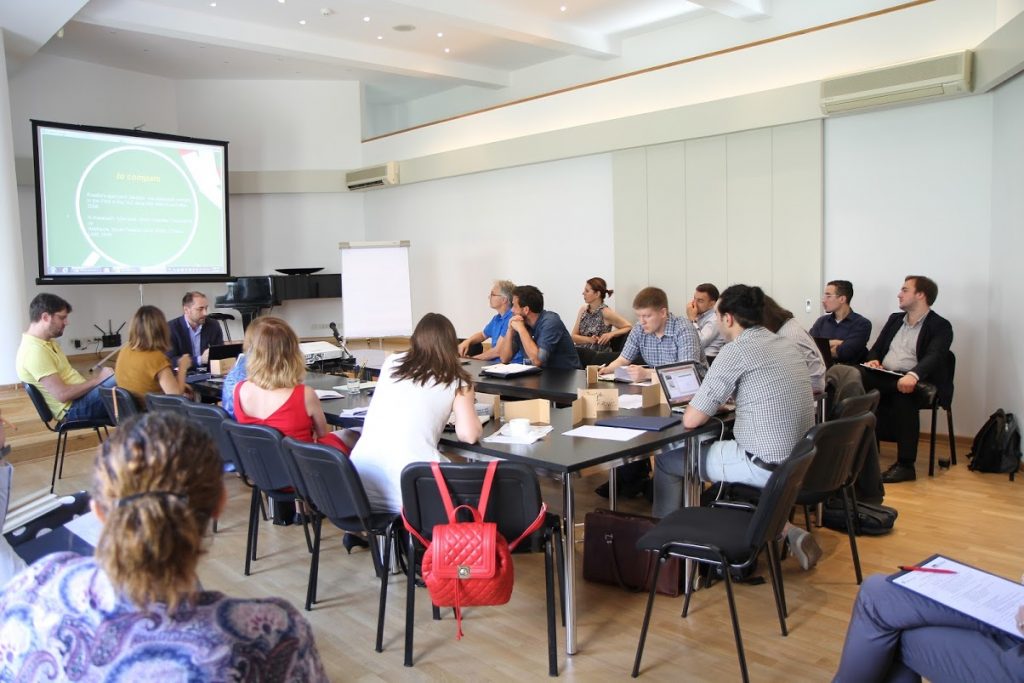
On 7 July, the Center for Governance and Culture in Europe at the University of St Gallen together with the Leibniz Institute for East and South East European Studies Regensburg organized a one-day workshop on the future of secessionist conflicts in the wider Black Sea region. The event was held in Bucharest at the New Europe College and brought together mostly young researchers from Germany, Switzerland, Georgia, Romania, Bosnia-Herzegovina, Czechia, Russia, Azerbaijan and Moldova. In three sessions, participants sought to establish the state of the art in the field of research on secessionist conflicts and – inspired by the University of St Gallen’s research as part of EU-STRAT’s work package 3 – to deliberate on the interdependencies of different secessionist conflicts.
Panel I explored the issue of commonalities and differences between protracted conflicts by focusing on the cases of Abkhazia, South Ossetia, Crimea and Republika Srpska. For one, it touched upon the philosophical question of under which circumstances secession can be justified and whether in the wake of Putin’s justification for annexing Crimea secession may become regularized rather than remain reserved only to extremely oppressed peoples. The argument was made that the Russian foreign policy elite’s approaches to separatist statelets changed not in 2014 but in 2008 following the war in Georgia and Kosovo’s declaration of independence. Moreover, it was emphasized how important not only the ethnic imaginary but also an idealized memory of the Socialist social order was for secessionism and how detrimental intrusive policies by the EU could be – for instance in Bosnia-Herzegovina – for the growth of a culture of democratic accountability.
The second panel concentrated on interdependencies between protracted conflicts in the post-Soviet space and delved into the particularities of relations between Russia and Transnistria as well as the economic cost of conflict in Nagorno-Karabakh. There are some forms of institutionalized exchange between the ‘post-Soviet four’ but the lack of further cooperation is not only due to the preference for other relations (e.g. to Russia) but to different ambitions among local elites and some level of competition over international recognition. Whereas in general the level of the client states’ leeway towards the patron is proportional to the severity of the security threat, for the post-Soviet space the global financial crisis marked a turning point as fiscal dependence on Russian aid reduced agency substantially. The militarization and brinkmanship of the Nagorno-Karabakh conflict meanwhile not only imposes high economic costs on states and communities but also negatively effects education, services, corruption and democracy.
In the third panel on the role of international actors, presentations dealt with the international community’s stabilization dilemma and with the contentious part played by international organizations in shaping dialogue and confidence-building measures in Ukraine and Moldova. As unilaterally seceding entities can subsist even without international recognition, the international community faces the insoluble dilemma that efforts to stabilize the situation on the ground, for example through development work, run counter to efforts to stabilize the international state system. In the case of Ukraine, efforts by the EU and OSCE to foster track 2 and track 3 forms of dialogue in a process of orchestration were hampered by very different understandings among Ukrainian stakeholders of what actually constituted dialogue. Similarly, different agendas among donors and the Moldovan government have created downsides for civilian confidence-building measures regarding relations between Transnistria and the right-bank.
The panels were followed by a collective brainstorming session to develop new avenues for the future of this research field and to sow the seeds for collaborative research projects. One strand of argument arose over the need to provincialize the post-Soviet space and to engage more directly with research on secessionist conflicts in other world regions such as Africa as well as with more theoretical approaches from the field of conflict studies and international relations theory. Overall, the workshop benefitted from a very open and collegial atmosphere and there was a general sense that it would lead to further get-togethers in the near future.
You can find the full workshop programme here:
http://www.nec.ro/data/pdfs/public-events/2018/july/2018-07-07_Workshop.pdf
